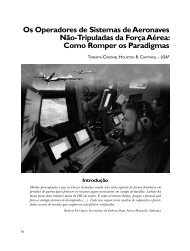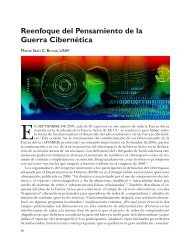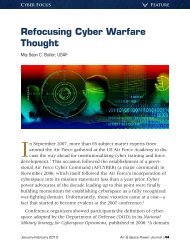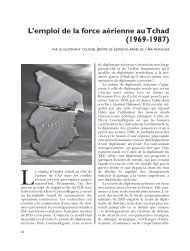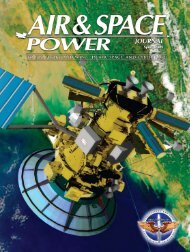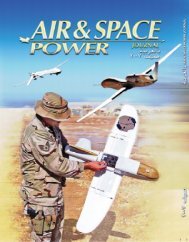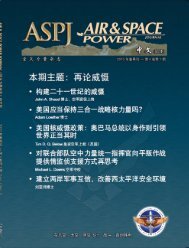80 AIR & SPACE POWER JOURNAL FALL <strong>2006</strong>Using maritime strategy as a framework forspace strategy has benefits, but this approachhas weaknesses too. The most readily apparentone is the disparity between the requiredtechnologies to operate within the two environments.Despite the sophistication andtechnological advancement of today’s warships,they generally are not as advanced asmost spacecraft. The technological sophisticationrequired to operate from, through, andin space seems more similar to that requiredto operate in the air—especially aircraft designedto fly at very high speeds and altitudes.Since available technology frequently dictatesmilitary tactics, it stands to reason that tacticsemployed in space should more closely resemblethose of air operations rather thanmaritime operations. 21If maritime operations seem to have littleapplicability at the tactical level of space warfare,the war fighter might wonder about theutility of a maritime-inspired space strategy.The answer lies in a paradox: at the tacticallevel of warfare, space activities resemble airactivities, but at the strategic level of warfare,space activities resemble maritime activities. 22Regardless of the shortcomings arising fromthe technological and tactical disparities betweenspace and maritime operations, onecan formulate the strategic principles of spacewarfare without considering the precedent oftechnology and tactics, which tend to changewith the passage of time anyway. This is a goodthing since strategic principles—if indeedthey are such—should remain timeless. 23 Sousing a maritime strategy as a framework actuallyincreases the likelihood of deriving an enduringstrategy of space warfare.Even though the diplomatic, informational,military, and economic interests in the maritimeenvironment closely resemble those inthe space environment, space is not the sea.Despite the strategic-level similarities betweenmaritime and space operations, the aforementionedtechnological and tactical differencesbetween the two environments necessitate thatany space-warfare strategy have a context andlexicon all its own. 24 Therefore, a maritimeinspiredspace strategy simply provides a commonlanguage for thinking about military operationsfrom, into, and through space.What It Means for<strong>Space</strong> StrategyAlthough the power approach to spacestrategy is prevalent among military planners,one should note that much of a maritimeinspiredstrategy for space already agrees withcontemporary literature on space strategy. Asmentioned above, maritime strategic thoughtsuggests that space has inherent value as ameans of communication, making it vital toensure one’s access to and use of space. Thisthinking is supported by Joint Publication3-14, Joint Doctrine for <strong>Space</strong> Operations, whichnotes the need to “provide freedom of actionin space for friendly forces while, when directed,denying it to an adversary.” 25 Consequently,joint doctrine properly emphasizesthe need to ensure one’s access to and use ofcelestial LOCs while minimizing the enemy’ssame access and use. 26Additionally, a maritime-inspired spacestrategy underscores the idea that space operationsand activities are closely tied to nationalinterests. This thought is borne out by the factthat much of the US economy and its day-todaycommercial operations rely upon spaceenabledsystems; furthermore, because spacereliantcommerce and trade affect the overalleconomic well-being of the United States,space is tied to national power. More importantly,the precedent of maritime strategy suggeststhat any spacefaring nation may protectand defend its interests in space, even with theuse of force. Such sentiments are in agreementwith the <strong>Space</strong> Commission Report of 2001,which maintains that because the UnitedStates relies upon many space-enabled technologies,it may protect its interests by employingmeans that “deter and defend” againsthostile acts in and from space, including, byimplication, the potential use of force. 27Nevertheless, a maritime-inspired spacestrategy also provides insights not found inthe current literature on space strategy. Themost profound of them concern the proper
SPACE POWER 81role of offensive and defensive strategy. Offensivestrategy in space becomes appropriatewhen political objectives necessitate wrestingor acquiring something from the adversary;such operations frequently achieve politicalgoals or establish a military advantage. In lightof Clausewitz’s and Corbett’s belief that the offensiveis the more effective form of warfare,the stronger space power should usually attemptoffensive operations in space. 28 A forcethat takes the offensive and looks for a decisivevictory, however, will likely not find it sincethe enemy’s most vital assets and forces willusually take defensive or other proactive measureswhen attack is imminent. For this reason,war fighters must exercise caution whendeciding in favor of offensive operations;otherwise, they may throw away space-basedsystems on “ill-considered offensives.” 29Defensive strategy, on the other hand,comes into play when political objectives necessitatepreventing the enemy from achievingor gaining something. Because defensiveoperations by their very nature are the“stronger” form of warfare, less capablespace forces should use them extensivelyuntil they can adopt an offensive strategy. 30A truly defensive posture awaits the blowfrom a position of advantage. 31Although it is often simpler to discuss offensiveor defensive strategies separately, theyare mutually dependent and so intertwinedthat ultimately one cannot succeed withoutthe other. For instance, defensive operationsprotect the very LOCs that make offensive operationspossible. Additionally, defensive strategiesfrequently require fewer forces and assetsthan do offensive strategies, so defensive operationsin some regions facilitate the concentrationof military forces or effects to supportoffensive operations in other regions.The primary objective of space warfare is toensure one’s ability to access and use celestialLOCs. In maritime strategy, the cruiser assuressuch access; in the classical sense, this vesselhas sufficient range and endurance to protectdistant and dispersed SLOCs. Because maritimeand space strategies share similar fundamentalconcerns, one needs a conceptualequivalent to the naval cruiser to protect anddefend interests in space. 32Understandably, the pragmatic war fighterwill want to know specifics on how to implementa “space cruiser.” Such specifics lie morein the realm of technology and tactics insteadof strategy, but a maritime-inspiredspace strategy is useless unless it can providereal-world, tactical examples. In order to designand implement a cruiser concept forspace, one must realize that its mission involvesensuring access to and use of space.The specific design of this concept dependsupon the mission it must perform, not preconceivedideas resulting from an analogy to aseagoing surface vessel. Consequently, implementinga cruiser concept for space necessitatesfielding platforms and systems that allowfor the self-defense of LOCs, afford redundancyof space-communication services, andprotect high-value assets. Technological andtactical examples of such systems include communicationsatellites designed to employdirected-energy weapons in self-defense whenattacked by another space-based system; orbitalspares of high-value satellites that provideservices in the event of the primary satellite’sloss; hunter-killer microsatellites capableof ramming an adversary’s threatening satellite;or a space-based weapons platform thatdetects, engages, and destroys an enemy’santisatellite (ASAT) weapon. 33Yet celestial LOCs presently employ bothterrestrial and space assets, as with communicationuplinks and downlinks. This observationimplies that the space-cruiser conceptmust include land, sea, and air platforms aswell to protect one’s access to and use of space.Consequently, the concept also includes utilizationof landline communication networks thatact as a redundant communication path to aspace-based network, launch vehicles meantto replace a damaged satellite in orbit quicklyand responsively, naval vessels capable oflaunching missiles to destroy an enemy’s ASATlaunch vehicle, or an airborne laser that disablesa satellite which is jamming orbital communications.As mentioned above, space warfareseeks to access and use celestial LOCs, soregardless of whether the space-cruiser con-
- Page 2 and 3:
Chief of Staff, US Air ForceGen T.
- Page 4 and 5:
PIREPsJoint Airspace Management and
- Page 6 and 7:
APJInterdependenceKey to Our Common
- Page 8 and 9:
6 AIR & SPACE POWER JOURNAL FALL 20
- Page 10 and 11:
APJLT COL PAUL D. B ERG , USAF, CHI
- Page 12 and 13:
10 AIR & SPACE POWER JOURNAL FALL 2
- Page 14 and 15:
ASPJLT COL PAUL D. B ERG , USAF, CH
- Page 16 and 17:
True to form, the Air Force has res
- Page 18 and 19:
Red Flag Still Matters—After AllT
- Page 20 and 21:
Integration of Space-BasedCombat Sy
- Page 22 and 23:
est alternative. In other cases, un
- Page 25 and 26:
power projection, but advances in a
- Page 27 and 28:
3. Report of the Commission to Asse
- Page 29 and 30:
PIREP 27ized, programmed, funded, a
- Page 31 and 32: PIREP 29creation of ACMs. One antic
- Page 33 and 34: PIREP 31Link 16 and Joint Airspace
- Page 35 and 36: PIREP 33Missile Defense Systems, th
- Page 37 and 38: CADRE’s Professional EducationOpp
- Page 39 and 40: ASPJQuick-LookThe Air Force Needs N
- Page 41 and 42: QUICK-LOOK 39system should become a
- Page 43 and 44: APJThe Air Force’s New Ground War
- Page 45 and 46: THE AIR FORCE’S NEW GROUND WAR 43
- Page 47 and 48: THE AIR FORCE’S NEW GROUND WAR 45
- Page 49 and 50: THE AIR FORCE’S NEW GROUND WAR 47
- Page 51 and 52: THE AIR FORCE’S NEW GROUND WAR 49
- Page 53 and 54: THE AIR FORCE’S NEW GROUND WAR 51
- Page 55 and 56: New USAF Doctrine PublicationAir Fo
- Page 57 and 58: Counterinsurgency AirpowerAir-Groun
- Page 59 and 60: COUNTERINSURGENCY AIRPOWER 57ticula
- Page 61 and 62: COUNTERINSURGENCY AIRPOWER 59and Ai
- Page 63 and 64: COUNTERINSURGENCY AIRPOWER 61The af
- Page 65 and 66: COUNTERINSURGENCY AIRPOWER 63squadr
- Page 67 and 68: ASPJQuick-LookA New Operational Ass
- Page 69 and 70: QUICK-LOOK 67den on the OAT. First,
- Page 71 and 72: Filling the Stealth Gap and Enhanci
- Page 73 and 74: FILLING THE STEALTH GAP 71Each of t
- Page 75 and 76: FILLING THE STEALTH GAP 73the US wa
- Page 77 and 78: FILLING THE STEALTH GAP 75mit the F
- Page 79 and 80: Space PowerAn Ill-Suited SpaceStrat
- Page 81: SPACE POWER 79by using a more encom
- Page 85 and 86: SPACE POWER 83achieve supremacy in
- Page 87 and 88: Military TransformationEnds,Ways, a
- Page 89 and 90: MILITARY TRANSFORMATION 87to organi
- Page 91 and 92: MILITARY TRANSFORMATION 89course, w
- Page 93 and 94: MILITARY TRANSFORMATION 91mind-set
- Page 95 and 96: MILITARY TRANSFORMATION 93sponding
- Page 97 and 98: NOTAM 95The document’s authors ha
- Page 99 and 100: MOLECULAR NANOTECHNOLOGY AND NATION
- Page 101 and 102: MOLECULAR NANOTECHNOLOGY AND NATION
- Page 103 and 104: MOLECULAR NANOTECHNOLOGY AND NATION
- Page 105 and 106: MOLECULAR NANOTECHNOLOGY AND NATION
- Page 107 and 108: MOLECULAR NANOTECHNOLOGY AND NATION
- Page 109 and 110: ASPJQuick-LookThe Nature of Close A
- Page 111 and 112: QUICK-LOOK 109CAS missions. The pub
- Page 113 and 114: Clausewitz and the Falkland Islands
- Page 115 and 116: CLAUSEWITZ AND THE FALKLAND ISLANDS
- Page 117 and 118: CLAUSEWITZ AND THE FALKLAND ISLANDS
- Page 119 and 120: CLAUSEWITZ AND THE FALKLAND ISLANDS
- Page 121 and 122: CLAUSEWITZ AND THE FALKLAND ISLANDS
- Page 123 and 124: BOOK REVIEWS 121whose contributions
- Page 125 and 126: BOOK REVIEWS 123Franco: Soldier, Co
- Page 127 and 128: APJAir and Space Power Journal, the
- Page 129 and 130: CONTRIBUTORS 127Col Howard D. “Da
- Page 131: EDITORIAL ADVISORY BOARDGen John A.



